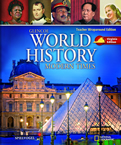Glencoe World History: Modern Times © 2011 Virginia EditionChapter 8:
The Muslim EmpireStudent Web Activity Lesson PlansThe Ottoman Sultan Introduction The Ottoman Empire had a complex system of governance that, at its height, combined an effective dynastic system, a unifying religion, and a powerful military force. In this activity students will examine the sultan’s role in the Ottoman Empire as well as the role and treatment of the conquered people. Lesson Description
Students will go to a Web site about the Ottoman Empire that discusses the role of its ruler, its principles of faith, and its military establishment. Students will read the information and answer four questions about what they have read. They will then compose a diary entry from the perspective of either a Christian boy who has been recruited into the Ottoman military or a non-Muslim living in the Ottoman Empire. The activity is an opportunity for students to imagine what life was like for the conquered people in the Ottoman Empire. Instructional Objectives
- The learner will be able to describe the role of the sultan, the principles of faith, and the military establishment in the Ottoman Empire.
- The learner will be able to apply knowledge about the role and treatment of the conquered people to describe what life was like in the Ottoman Empire.
Student Web Activity Answers - The sultan was the highest authority. In theory his powers were absolute, but in practice they were limited by religious leaders, important members of the dynasty, the bureaucracy, and the military.
- Seriat was the Islamic law in the Ottoman Empire. It extended the power of the sultan, because the law stated that the sultan was God’s agent in the world and was responsible only to God.
- When recruits for the military were needed, Christian boys were taken as slaves and converted to Islam. After growing up and being trained, they took on all kinds of roles in the imperial establishment and the military.
- Non-Muslims were tolerated in the empire. They were allowed to practice their religions and operate schools, religious establishments, and courts based on their own customary law.
- Students' diary entries will vary but should include relevant information about the treatment of non-Muslims in the Ottoman Empire.
 | 

















